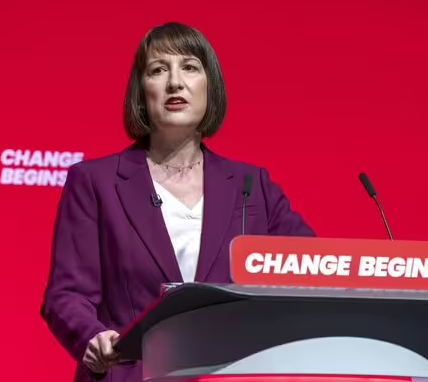Inside the town where Rachel Reeves is MP – abandoned shops and businesses on the brink.H

Businesses across Rachel Reeves’s constituency are worried about the impact her Budget will have on their futures (Image: Andy Commins/Getty)
The abandoned textile mills that loom large on the horizon as the train pulls into Pudsey serve as a reminder of the perilous nature of business.
Like many parts of the north of England, Chancellor Rachel Reeves’s constituency of Leeds West and Pudsey is full of grand old factories that were once the heartbeat of the local economy but now stand dormant, as a visual representation of the decline of British industry.
In the years since their closure, the heartbeat of the local economy shifted from the mills to the high street, its expansion providing employment and prosperity to those who filled the workers’ terraced houses long after the factories had closed.
But the expansion of the high street is no more. Now, once thriving pubs and shops in this corner of West Yorkshire have closed down.
And struggling businesses fear for their futures as the prospect of the increased costs of doing business looms large in the wake of their own MP’s October Budget.

Cafe owner Ben Hicks believes the changes in the Budget could add £30k to his bottom line (Image: Andy Commins / Daily Mirror)
In parts of Reeves’s constituency some of these mills have been repurposed and in one that’s been turned into a café, owner Ben Hicks, 40, looks to be thriving as he serves dozens of diners during a busy lunch shift in the quaint village of Farsley.
But beneath his cheery customer-facing exterior lie concerns over how his business, the Mill Café, will have to adapt following the range of tax hikes recently introduced by his local MP.
The tax hikes include an increased minimum wage and larger national insurance contributions with the threshold at which payments will be due being lowered considerably.
He told the Express: “The national insurance increase will hit us significantly.
“With changes to minimum wage and the national insurance contribution threshold, it is basically going to impact everybody we employ, whether they are on minimum wage or not.
“We employ 22 people. That’s probably going to cost us £20,000 over the course of a year before you factor in National Insurance on top of that. All told, we’re looking at £30,000.”
Mr Hicks is tempered in his reaction to the increase, optimistically hoping that in the long run, a less economically strained workforce with better public services will be good for business.
Farsley is relatively affluent in comparison to other areas of the constituency, with old mills turned into Pilates studios, interior design stores and cheesemongers.
A relative degree of comfort may allow owners to be more objective in their appraisal of the Chancellor’s first budget and take a long-term view, but others are less forgiving.
Jason Shearer, 52, runs a café in the town of Pudsey, a town where the difficulties of running a business are evident from the array of boarded up shops that blight the high street.

Jason Shearer fears the impact of an increased minimum wage (Image: Andy Commins / Daily Mirror)
Invalid email
We use your sign-up to provide content in ways you’ve consented to and to improve our understanding of you. This may include adverts from us and 3rd parties based on our understanding. You can unsubscribe at any time. Read our Privacy Policy
Despite being just a three-minute drive away from Farsley, the market town of Pudsey is noticeably different.
The luxury Pilates studio mill conversions are replaced by charity shops and so many barbers you wonder how often people get their hair cut, despite few seeming to have much custom.
The difficulties facing businesses, especially in the hospitality sector, is evident immediately from the number of pubs and shops boarded up and seeking new tenants.
For Mr Shearer, the potential long-term benefits of the Chancellor’s budget are meaningless if his business doesn’t survive that long.
He believes that the increase in the national minimum wage is the biggest threat, despite being heralded by those set for a pay increase.
He told the Express: “We need more help for businesses, we’re on the breadline, we’re only just breaking even.
“Minimum wage kills us, it is killing everybody, minimum wage is a joke but also increases to holiday and sick pay are ridiculous too.
“It has already been the difference between hiring somebody and not. I am working more hours because I can’t afford to take anybody else on because as soon as you do you’ve got all these costs – you just can’t afford it.
“I don’t think they realise how much of an effect it has, businesses just can’t afford to pay staff. We have had so many people coming in and asking for jobs but we just can’t take anybody on.”
Our final stop is Armley, a working-class district in the shadow of Leeds United’s Elland Road stadium, where terraced back-to-back houses grew out of the Industrial Revolution.

In Armley, a horse stands tethered to a dilapidated council installed outdoor gym (Image: Andy Commins / Daily Mirror)
As we approach the high street, via a tower block, we make our way past a horse chained up to a council installed outdoor gym a visual reminder of just how little impact local and central government often have on areas like this.
The high street is a melting pot, where new Eastern European and Middle Eastern businesses compete to survive against those that have been around for generations.
But in the current climate, competition has never been harder.
Pete Farrell, 57, owns a carpet shop and says that this year has been the toughest in the eight that he has run his business.
He told the Express: “Nobody has any confidence in the economy, so people just aren’t spending.
“I’ve grown the business to sell mid-range products. But the problem is, those on benefits are still spending because the money comes next week, the affluent who are purchasing top-end products are still spending but Joe Public, they’re not, they’re waiting.
“I’m £45,000 down on last year and I’ve got to run until April; it is the toughest it has ever been.”
The mood across the constituency on the Chancellor’s first few months in office range from disappointment to disgust, mirroring the mood nationwide.
Countless times requests for comment are met with upturned faces or declarations that their views would be so strong that they would be unprintable.
Approval ratings on Reeves’s suitability for the second most important job in the country have fallen drastically since she assumed office.

The owner of this shop says that this year has been the toughest he has seen (Image: Andy Commins / Daily Mirror)

In Armley high-street residents told us of their frustration at the amount of barber and vape shops (Image: Andy Commins / Daily Mirror)
According to a recent poll by YouGov, only 15% of people believe that she is the best person for the job, down from a peak of 31% in the weeks following the election.
For those over 65, only 11% of voters retain faith in her.
In Pudsey, the biggest town in Reeves’s constituency, just under one in five people are aged 65 or over and here, like anywhere in the UK, the controversial scrapping of the winter fuel allowance is perhaps the one policy that Reeves is universally known for.
Susan Watson, 52, works in the local Age UK and has seen firsthand the impact that the removal of the £300 payment to help with energy bills is having.
She told the Express: “She’s not too well liked anymore, put it that way.
“Taking money away from pensioners is a disgrace. You tell people to vote and then they get in and it’s all the same.
“I encouraged people to vote. We needed a change and now you see what they have done as soon as they get in; they’ve proved that they’re all the same.
“We’re seeing so many people lose out on the payment and then not be eligible for pension credit by a few pounds.”
One of those impacted is pensioner Jeff Wood, 82, who feels under no obligation to hide his disgust for a party he once supported.
He told the Express: “I won’t vote Labour ever again; they do nothing for the old aged pensioners.

One of the many closed down businesses in Pudsey, the biggest town in Reeves’s constituency (Image: Andy Commins / Daily Mirror)

Businesses still operating in the constituency fear that they could be next to close (Image: Andy Commins / Daily Mirror)

A closed down Pudsey pub. Hospitality is likely to be his hardest by Reeves’s Budget (Image: Andy Commins / Daily Mirror)
“The worst thing they have done is taken the £300 off us. We know so many old aged pensioners who are in their own home and I don’t know how they are going to manage.”
“I wouldn’t vote for her again” is a comment made dozens of times amongst those approached in the street, with many saying they wouldn’t bother to vote if in the unlikely event that another general election was called any time soon.
Reeves won her seat convincingly in July with 49% of the vote – three times as many votes as both Reform and the Conservatives.
But it becomes apparent very quickly that views on her performance are not mixed, they are resounding, and they are scathing.
Powered by 
After speaking to dozens of her constituents, none indicated that they were impressed with her performance or that they would vote for her to represent them again.
The removal of the winter fuel payment is a policy that seems to be synonymous with Reeves.
That coupled with general dissatisfaction with Labour’s performance paints a bleak picture for Keir Starmer so soon after his government stormed to power.
Page 2
Top Comments
-
Comment by NineFingers.
So many of our current problems can be traced back to Thatcher and her philosophy!!
Privatisation of power, water, public transport, all been terrible for the public, but made owners and managers wealthy.
Right but, was great for those at the time, but terrible for our grandchildren, the lack of social housing is why the rental market is out of control.
She destroyed industries and never replaced them, many Northern towns have never recovered.
Thatcher and her philosophies were the worst thing to happen to this country in the 2nd half of the last century.
-
Comment by rosie101.
Most businesses can cope with one charge and will adapt their business to that change. However, what Labour has done is 3 changes, the huge increase in employer contribution, the rise in the minimum wage and then the change in employment rules. Far to much for businesses no matter the size to absorb without impact. Proposed pay rise, won’t happen or it will be a great deal smaller, recruitment as we have seen is down, and sadly many will lose their jobs, and some smaller businesses will close. How Labour could not work this out is beyond me, you don’t need to be an “economist”.
-
Comment by jontysnut.
Sean
Pudsey’s issues predate this government. Of the three photos of “abandoned businesses”, two were banks/building societies which closed long ago – mainly because people are not visiting branches – and the pub is a Sam Smith’s pub which closed pre pandemic and which are often closed down by the eccentric brewery chairman. Meanwhile there is a newly opened greengrocer which is always busy.
-
Comment by marco mancini.
The North of England is an old unresolved issue , quaint town and villages in disrepair thanks to BREXIT which has destroyed tourism and high streets there , back in the days there were glittering red boxes and the BOBBY on the BEAT along with the postman leaving “THE SUN” in the driveway now those villages are full of fentanyl and crumbling victorian detached houses , “OUR” Britain has been swept away by NIGEL FARAGE , DAVID FROST and BORIS JOHNSON .
KEIR STARMER must bring the nation back into the Common market and the EU now , set up a TRILLION FUND to renovate and refurbish , starting back the EUROPEAN YOSKSHIRE FUND which opened up libraries and funded councils there to keep the youths out of neglect , making the north of england the “HUB ” for the “LINGUA FRANCA ” for young europeans to enjoy should be the number one priority for the “REAL CHANGE” .


